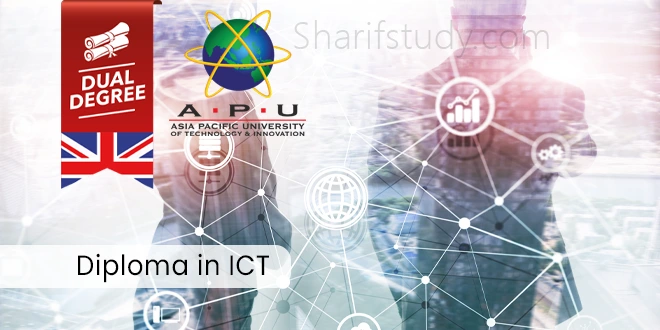APU Diploma in ICT program aims to provide Learners with a broad range of software, technical, and technological ICT abilities essential in the industry at the diploma level. After completing this course, the student is expected to be able to develop and apply ICT solutions to practical business problems. The course of study prepares learners to manage and support business-related computer systems with their technology skills. This training also fills gaps in organizational data storage, business continuity, disaster recovery, security, business analytics and optimization, and enterprise architecture.
The course is designed to be accessible to those with minimal ICT backgrounds, and as such, it is a good starting place for students interested in learning more about information, communication, and technology.
Program Outline
APU Diploma in ICT is specifically designed to teach students :
- Coverage includes the academic and vocational aspects of the wider field of computing and information and communications technology.
- Students with skills that will equip them for positions in the ICT industry, with an emphasis on solution design, software development, and computer system servicing.
- Students with academic and professional skills to produce solutions requiring the use of technology in a commercial and organizational setting, in order to respond to ongoing future changes in technology and industry practices.
- Students with critical, independent, and cooperative skills in learning to help them adapt to future changes in business processes.
Semester 1
Students will learn basic mathematical, language, and communication abilities, as well as key information technology skills, at the start of the curriculum. Students will learn the fundamental concepts and vocabulary of technology and business management.
Courses
- Academic Research Skills
- Intro to Visual and Interactive Programming
- Digital Thinking and Innovation
- Information Systems
Semester 2
The second semester builds on and expands on the fundamental information gained in the previous semester. Language and communication skills are enhanced to higher degrees of research and professionalism. It gets easier to use technology and figure out how to use mathematical skills to analyze and solve problems.
Courses
- Operating Systems and Computer Architecture
- Database Management
- Discrete Mathematics
- Professional Communications
Semester 3
This semester introduces students to new topics in information and communication technology, such as computer programming, databases, Internet applications, and computer system design. Students with this knowledge can use computing resources and methods to deal with common problems in the real world.
Courses
- Programming with Python
- Introduction to AI
- Algebra and Calculus
- Fundamentals of UI/UX Design
Semester 4
Students receive access to more advanced development ideas, such as the use of concepts of usability in web design and development, as well as the system development cycle. Employability skills are provided through IT Operations Management principles and concepts, preparing students to provide technical support inside an organization.
Courses
- Responsive Web Design & Development
- Introduction to VRAR and Metaverse
- Fundamentals of Entrepreneurship
- System Analysis and Design
- Object Oriented Programming
Semester 5
In their final semester, students learn the fundamentals of computer networks, digital security, and forensics in order to broaden their understanding of computing technology and ethical duties. Students must also create and execute algorithms in their second programming language, as well as complete a Software Development Project to demonstrate their ability to integrate skills, knowledge, and understanding from the entire program, including multimedia techniques for business presentations and entertainment.
Courses
- Cyber Security and Forensics
- Networking Technologies
- Capstone Project
Elective Courses
- Digital Operations Management
- Introduction to Internet of Things
- Introduction to Mobile Technologies
Semester 6 – Internship (8 weeks)
Students must take part in an Internship/Industrial Training program for a minimum of 8 weeks. This program aims to provide a smooth transition for students from their educational environment to the formal workplace.
Additional Studies
After successfully completing this program with a CGPA of 2.5 or above and fulfilling the credit transfer requirements, students will be able to continue to Level 2 of the following APU degree programs.
- Bachelor of Science (Honors) in Information Technology
- Bachelor of Science (Honors) in Information Technology with a specialism in:
- Information System Security
- Cloud Engineering
- Internet of Things (IoT)
- Digital Transformation
- Financial Technology (FinTech)
- Business Information Systems
- Sustainable Computing
- Bachelor of Science (Hons) in Software Engineering
- BSc (Hons) in Computer Science
- Bachelor of Computer Science (Hons) (Artificial Intelligence)
- BSc (Hons) in Computer Science (Cyber Security)
- BSc (Hons) in Computer Science with a specialism in:
- Data Analytics
- Digital Forensics
APU-DMU Dual Degree
Students enrolled in the Bachelor’s Degree Program are presented with the opportunity to join the APU-DMU Dual Degree Scheme. By choosing this pathway, upon graduation, students will be awarded two Degree Certificates & Transcripts: one from Asia Pacific University (APU) in Malaysia and another from De Montfort University (DMU) in the UK.
| Duration | Intakes |
| 2+ Years (6 Semesters) |
25 Apr 2024 | 04 Jul 2024 08 Aug 2024 | 19 Sep 2024 19 Nov 2024 |
Admission Requirements
| General Requirement | |
| SPM |
|
| IGCSE/O-LEVELS |
|
| UEC |
|
| CERTIFICATE |
|
English Requirements for International Students
- IELTS : 4.0
- TOEFL IBT : 30-31
- Pearson (PTE) : 36
- MUET : Band 3
Courses Fees
| Malaysian Students | International Students |
| RM 44,900 | RM 48,800 (USD 11,900) |
 SharifStudy Best way to Study in Malaysia
SharifStudy Best way to Study in Malaysia




